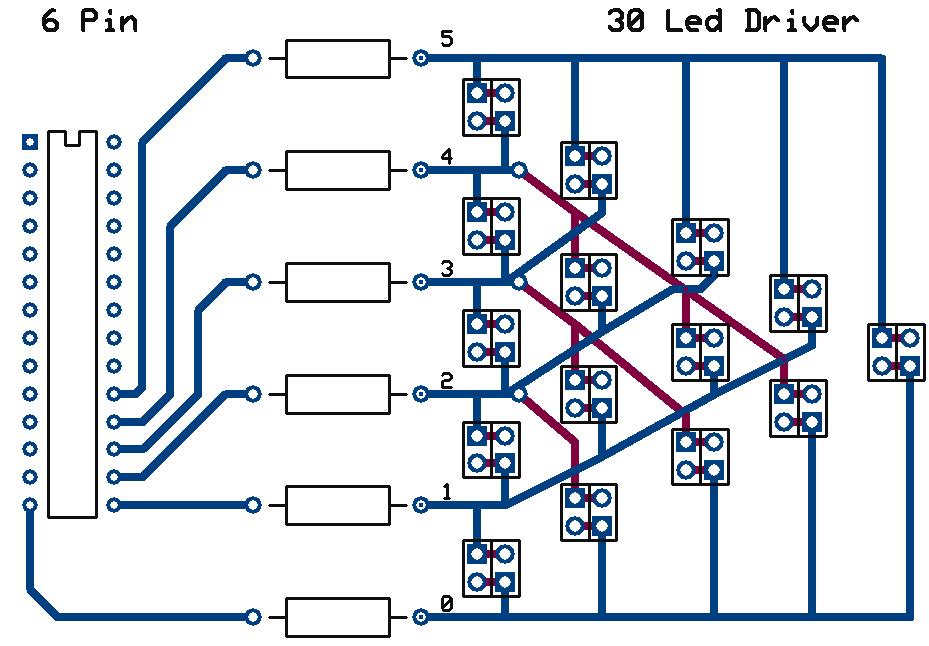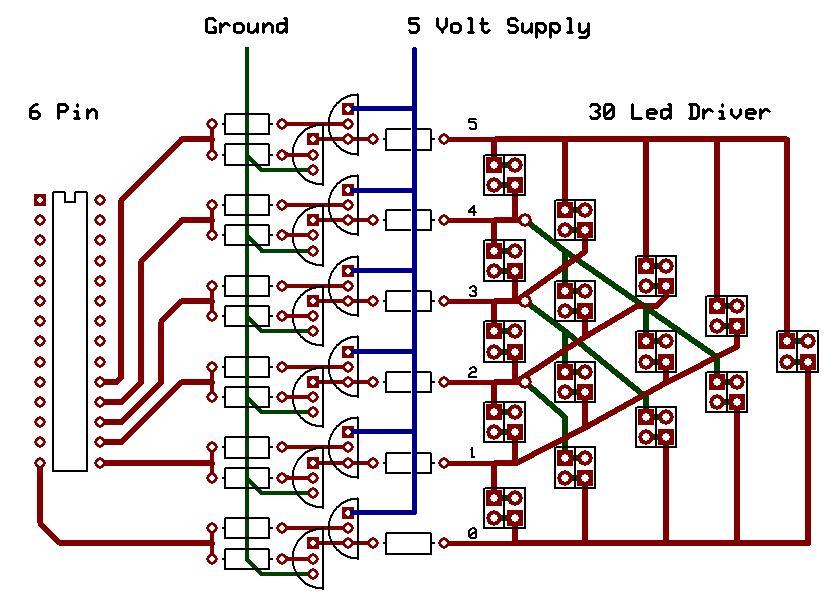Control 30 LEDS With 6 Pins On The ATmega168 Microcontroller
If under 20mA

If over 20mA use 6 PNP's and NPN's

#include <avr/io.h>
#include <avr/interrupt.h>
#define B0 0x01 // 0b00000001
#define B1 0x02 // 0b00000010
#define B2 0x04 // 0b00000100
#define B3 0x08 // 0b00001000
#define B4 0x10 // 0b00010000
#define B5 0x20 // 0b00100000
uint8_t volatile blinkLEDs = 1;
int main(void)
{
//***************************************** Setup 8-bit Timer 0 *****************************************//
TCCR0A = 0b00000010; // |COM0A1|COM0A0|COM0B1|COM0B0|0|0|WGM01|WGM00|
// COMA and COMB are set to normal, OC0A and OC0B are disconnected respectively
// WGM is set to CTC - Clear Timer on Compare (of OCR0A) Mode#2 = 010
TCCR0B = 0b00000000; // |FOC0A|FOC0B|0|0|WGM02|CS02|CS01|CS00|
// FOC set to default - WGM02 set to 0 - Clock set to off
TIMSK0 = 0b00000010; // |0|0|0|0|0|OCIE0B|OCIE0A|TOIE0|
// Timer Output Compare Match Interrupt A is enabled
TIFR0 = 0b00000000; // |0|0|0|0|0|OCFOB|OCF0A|TOV0|
// Flags are set to 0 - Default settings
OCR0A = 255; //
sei(); // Enables the global registers.
TCCR0B = 0b00000101; // |FOC0A|FOC0B|0|0|WGM02|CS02|CS01|CS00|
// Turn On Clock and set speed selection to Clock/1024
while(1)
{
}
}
ISR(TIMER0_COMPA_vect)
{
switch (blinkLEDs)
{
case 1: DDRB = B0|B1; PORTB = B0;blinkLEDs++;break;
case 2: DDRB = B0|B1; PORTB = B1;blinkLEDs++;break;
case 3: DDRB = B0|B2; PORTB = B0;blinkLEDs++;break;
case 4: DDRB = B0|B2; PORTB = B2;blinkLEDs++;break;
case 5: DDRB = B0|B3; PORTB = B0;blinkLEDs++;break;
case 6: DDRB = B0|B3; PORTB = B3;blinkLEDs++;break;
case 7: DDRB = B0|B4; PORTB = B0;blinkLEDs++;break;
case 8: DDRB = B0|B4; PORTB = B4;blinkLEDs++;break;
case 9: DDRB = B0|B5; PORTB = B0;blinkLEDs++;break;
case 10: DDRB = B0|B5; PORTB = B5;blinkLEDs++;break;
case 11: DDRB = B1|B2; PORTB = B1;blinkLEDs++;break;
case 12: DDRB = B1|B2; PORTB = B2;blinkLEDs++;break;
case 13: DDRB = B1|B3; PORTB = B1;blinkLEDs++;break;
case 14: DDRB = B1|B3; PORTB = B3;blinkLEDs++;break;
case 15: DDRB = B1|B4; PORTB = B1;blinkLEDs++;break;
case 16: DDRB = B1|B4; PORTB = B4;blinkLEDs++;break;
case 17: DDRB = B1|B5; PORTB = B1;blinkLEDs++;break;
case 18: DDRB = B1|B5; PORTB = B5;blinkLEDs++;break;
case 19: DDRB = B2|B3; PORTB = B2;blinkLEDs++;break;
case 20: DDRB = B2|B3; PORTB = B3;blinkLEDs++;break;
case 21: DDRB = B2|B4; PORTB = B2;blinkLEDs++;break;
case 22: DDRB = B2|B4; PORTB = B4;blinkLEDs++;break;
case 23: DDRB = B2|B5; PORTB = B2;blinkLEDs++;break;
case 24: DDRB = B2|B5; PORTB = B5;blinkLEDs++;break;
case 25: DDRB = B3|B4; PORTB = B3;blinkLEDs++;break;
case 26: DDRB = B3|B4; PORTB = B4;blinkLEDs++;break;
case 27: DDRB = B3|B5; PORTB = B3;blinkLEDs++;break;
case 28: DDRB = B3|B5; PORTB = B5;blinkLEDs++;break;
case 29: DDRB = B4|B5; PORTB = B4;blinkLEDs++;break;
case 30: DDRB = B4|B5; PORTB = B5;blinkLEDs=1;break;
}
}
#include <avr/io.h>
#include <avr/interrupt.h>
#define B0 0x01 // 0b00000001
#define B1 0x02 // 0b00000010
#define B2 0x04 // 0b00000100
#define B3 0x08 // 0b00001000
#define B4 0x10 // 0b00010000
#define B5 0x20 // 0b00100000
uint8_t volatile counterMax = 5; // Total number of Pins from 0 (ie 0 to 5 = 6 pins)
uint8_t volatile counter = 1;
uint8_t volatile startPin = B0;
uint8_t volatile currentPin = 0;
uint8_t volatile turnOn1st = 1;
int main(void)
{
//***************************************** Setup 8-bit Timer 0 *****************************************//
TCCR0A = 0b00000010; // |COM0A1|COM0A0|COM0B1|COM0B0|0|0|WGM01|WGM00|
// COMA and COMB are set to normal, OC0A and OC0B are disconnected respectively
// WGM is set to CTC - Clear Timer on Compare (of OCR0A) Mode#2 = 010
TCCR0B = 0b00000000; // |FOC0A|FOC0B|0|0|WGM02|CS02|CS01|CS00|
// FOC set to default - WGM02 set to 0 - Clock set to off
TIMSK0 = 0b00000010; // |0|0|0|0|0|OCIE0B|OCIE0A|TOIE0|
// Timer Output Compare Match Interrupt A is enabled
TIFR0 = 0b00000000; // |0|0|0|0|0|OCFOB|OCF0A|TOV0|
// Flags are set to 0 - Default settings
OCR0A = 255; //
sei(); // Enables the global registers.
TCCR0B = 0b00000101; // |FOC0A|FOC0B|0|0|WGM02|CS02|CS01|CS00|
// Turn On Clock and set speed selection to Clock/1024
while(1)
{
}
}
ISR(TIMER0_COMPA_vect)
{
DDRB = (startPin |(startPin<<counter));
if(turnOn1st)
{
PORTB = startPin;
turnOn1st = 0;
}
else
{
PORTB = (startPin<<counter);
turnOn1st = 1;
if(counter == counterMax)
{
startPin <<= 1; // startPin = startPin << 1
currentPin++;
counterMax--;
if (counterMax == 0)
{
startPin = B0;
currentPin = 0;
counterMax = 5;
}
counter = 0;
}
counter++;
}
}
#include <avr/io.h>
#include <avr/interrupt.h>
#include <inttypes.h>
#include <avr/pgmspace.h>
#define NUM_LEDS 30
#define B0 0x01 // 0b00000001
#define B1 0x02 // 0b00000010
#define B2 0x04 // 0b00000100
#define B3 0x08 // 0b00001000
#define B4 0x10 // 0b00010000
#define B5 0x20 // 0b00100000
typedef struct
{
uint8_t ddr;
uint8_t port;
} PortAndDDRState;
PortAndDDRState const PROGMEM leds[NUM_LEDS] = {
{ B0 | B1, B0 }, // LED 1
{ B0 | B1, B1 }, // LED 2
{ B0 | B2, B0 }, // LED 3
{ B0 | B2, B2 }, // LED 4
{ B0 | B3, B0 }, // LED 5
{ B0 | B3, B3 }, // LED 6
{ B0 | B4, B0 }, // LED 7
{ B0 | B4, B4 }, // LED 8
{ B0 | B5, B0 }, // LED 9
{ B0 | B5, B5 }, // LED 10
{ B1 | B2, B1 }, // LED 11
{ B1 | B2, B2 }, // LED 12
{ B1 | B3, B1 }, // LED 13
{ B1 | B3, B3 }, // LED 14
{ B1 | B4, B1 }, // LED 15
{ B1 | B4, B4 }, // LED 16
{ B1 | B5, B1 }, // LED 17
{ B1 | B5, B5 }, // LED 18
{ B2 | B3, B2 }, // LED 19
{ B2 | B3, B3 }, // LED 20
{ B2 | B4, B2 }, // LED 21
{ B2 | B4, B4 }, // LED 22
{ B2 | B5, B2 }, // LED 23
{ B2 | B5, B5 }, // LED 24
{ B3 | B4, B3 }, // LED 25
{ B3 | B4, B4 }, // LED 26
{ B3 | B5, B3 }, // LED 27
{ B3 | B5, B5 }, // LED 28
{ B4 | B5, B4 }, // LED 29
{ B4 | B5, B5 } // LED 30
};
uint8_t volatile nextLED = 0;
int main(void)
{
//***************************************** Setup 8-bit Timer 0 *****************************************//
TCCR0A = 0b00000010; // |COM0A1|COM0A0|COM0B1|COM0B0|0|0|WGM01|WGM00|
// COMA and COMB are set to normal, OC0A and OC0B are disconnected respectively
// WGM is set to CTC - Clear Timer on Compare (of OCR0A) Mode#2 = 010
TCCR0B = 0b00000000; // |FOC0A|FOC0B|0|0|WGM02|CS02|CS01|CS00|
// FOC set to default - WGM02 set to 0 - Clock set to off
TIMSK0 = 0b00000010; // |0|0|0|0|0|OCIE0B|OCIE0A|TOIE0|
// Timer Output Compare Match Interrupt A is enabled
TIFR0 = 0b00000000; // |0|0|0|0|0|OCFOB|OCF0A|TOV0|
// Flags are set to 0 - Default settings
OCR0A = 255; //
sei(); // Enables the global registers.
TCCR0B = 0b00000101; // |FOC0A|FOC0B|0|0|WGM02|CS02|CS01|CS00|
// Turn On Clock and set speed selection to Clock/1024
while(1)
{
}
}
ISR(TIMER0_COMPA_vect)
{
uint8_t ledNum = nextLED;
uint8_t ddr = pgm_read_byte (&leds[ledNum].ddr);
uint8_t port = pgm_read_byte (&leds[ledNum].port);
DDRB = ddr;
PORTB = port;
if (++ledNum == NUM_LEDS) {ledNum = 0;}
nextLED = ledNum;
}